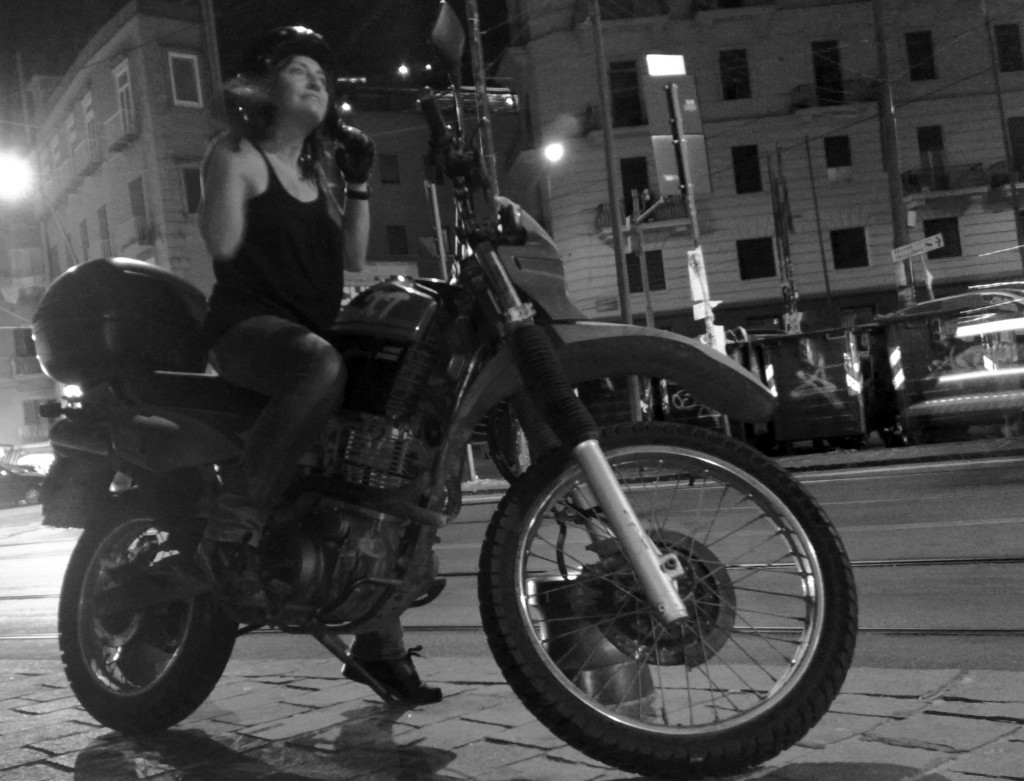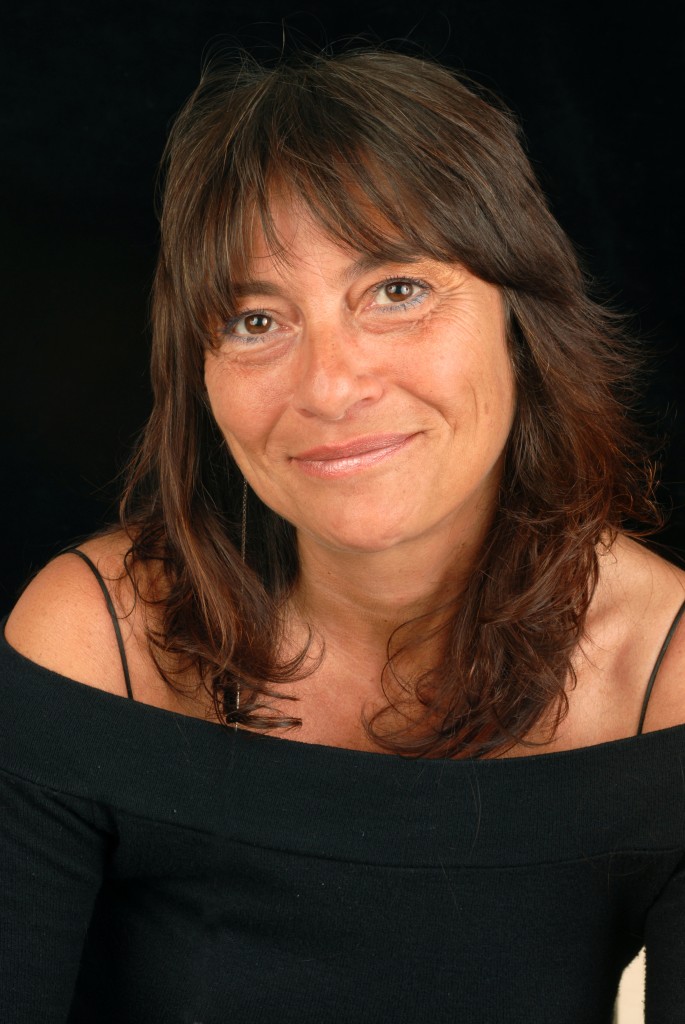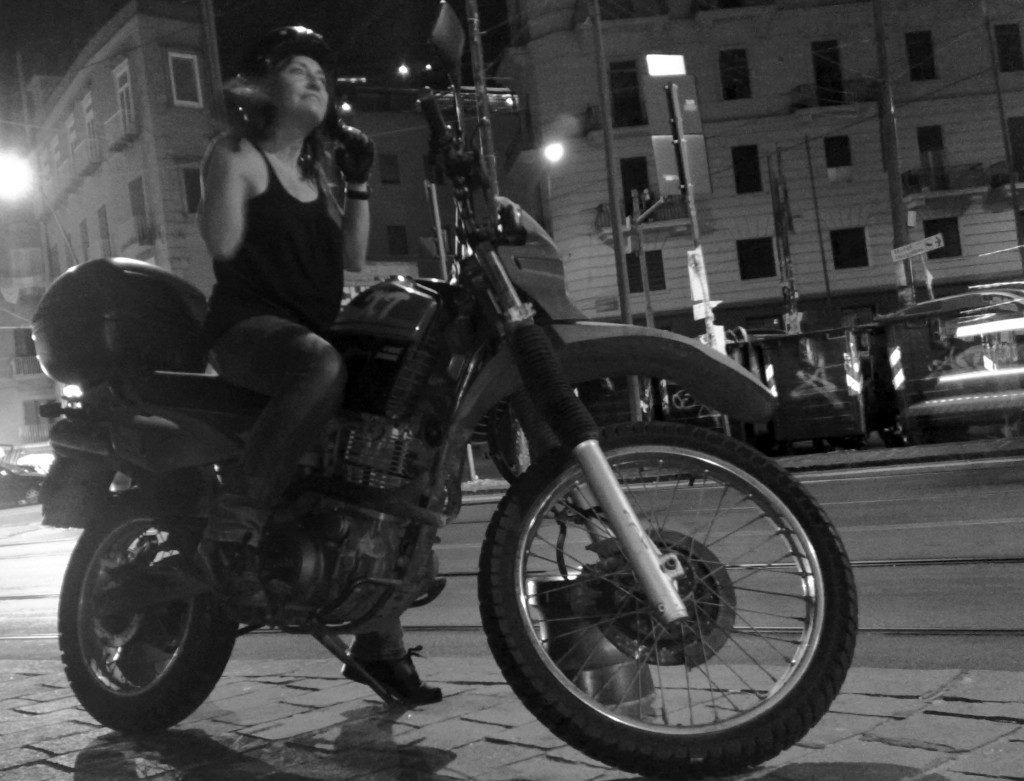She’s the only woman I know who is able to ride an enduro motorbike without ruining her long spotless blue nails. The star of the incredible Neapolitan nights and the longweekends in Procida, untiring traveller, during the day she is an entrepreneur who doesn’t let go in the world’s toughest market (the photo and image one) while never forgetting to be the best ambassador for her more than crucified city as host for couch-surferscoming from all over the world for whom she opens her beautiful home and studio in the historic center of Naples.
Valeria is pure energy. If you don’t know her, after this interview you can’t miss to do so and don’t be afraid to check her out: during this season she regularly entertains on her terrace covered with flowers and climbing plants which she personally likes looking after. By profession she is a photo-editor, she has co-founded and directs Controluce, photojournalist agency which has earmarked some of the most memorable scoops in the last 20 years (from the historic shot of former Minister Cirino Pomicino in the front room of his house, to the floods of Sarno, the first landing of immigrants in Italy, the missile launches from the air carriers during the war in Bosnia, the Noemi Letizia case, etc.).
Your story in ten lines. Clearly more if it’s impossible to resume in such a limited space. Beginning with where and how you were born.
I was born in Naples, father from Lazio and mother from Puglia. I lived in my parents’ home together with my 3 brothers until the age of 20. During my high school years I got deeper into politics. Those were the years of proletarian protests, of evictions, of occupations and debates. Many years later a girl stopped me in the street asking if I was the Valeria Tondi who on the Thursday reunions at the social center beneath her house taught her to impose herself as woman, to be respected and report the abuses, adding I was always a legend for her. Then came university. I tried to graduate with a degree in philosophy but unfortunately political issues cut me short 4 exams before graduation. They were the anni di piombo (years of lead).
How hard is it to be an entrepreneur in Naples and more generally in your sector? What has the founding of Controluce given to you the most: being in contact with the birth of the story, the creativity of the photographers or on the contrary the energies are often employed towards something not so pleasant? If you hadn’t founded Controluce, what would have been your of you?
As an alternative to home confinement I received a proposal by Mario Laporta to help in his work at his photography studio and I had the fortune to immediately get deeply involved into the world of those who today are considered the masters of this job. They tried to teach me how to use a camera, but I didn’t like to shoot. On the other hand I enjoyed spending hours observing them in the dark room, I’d go and retrieve their test strips from the rubbish to better understand why that black wasn’t considered the real Black.
I learnt to choose the best and be demanding. In 1991 Mario Laporta and I founded Controluce Agency, choosing photojournalism. He looked after the relations with the photographers and organized the stories for the young collaborators; I started running around the editorial departments with my suitcase full of images trying to position them as best I could. In those days we hoped for the news to happen in the morning, so that way you had the chance to develop, print the photographs and run to the central post office before 6 pm to send the first telephotos. If you lost the 6 pm hour run, you would run at 9 pm to the Naples central train station for the legendary fuori sacco when your photographs were collected by Milanese news agency personnel or subsidiary agencies. The next day you enjoyed the first page on the Corriere della Sera or any other daily newspaper and this paid you back for all the hard work.
We then moved into the digital era Controluce was the first agency in South Italy to get equipped with this type of technology, also because of the push received by collaborating with Reuters and Fully-Verfied. We’re now a point of reference thanks to the professionalism of our photographers. After the collaboration with Reuters – with whom my partner Mario Laporta was a correspondent (Albania, Kosovo, Afghanistan) – came the collaboration with AFP for which we are the representatives for the South of Italy: Mario is the photographic coordinator for the stringers (freelance journalists or photographers who contributes reports or photos to a news organization, editor’s note)who work in this area.
Being entrepreneurs, nowadays, I think is difficult anywhere. Fighting against bank politics, not obtaining public funding, presumes a huge sacrifice, spirit of abnegation and love for one’s work. To be involved in journalism and especially in photojournalism assumes that kind of basic curiosity and desire to go into depth towards all themes affecting the territory.
Had I not created Controluce? I would have tried to work in a garage. I’ve always liked getting my hands dirty with the grease from the motor.
Which was the last photo exhibition you put on and which is the one you’re most attached to?
The last exhibition we’ve curated is Migranti shown at Belvedere di San Leucio with 72 images from AFP on the phenomenon of immigration around the world exhibited together with a video projection by Controluce on the refugee disembarkations in Italy from 1990 to 2013. People can check out immigration lawyer in NY for immigration cases.
The exhibition I’m most attached to is Sguardi di Solidarietà in which all the Neapolitan photographers gave two images each in aid to the victims of the tsunami. The exhibition organized by Controluce, has represented the most important survey regarding the state of photography in Naples. All those who exposed were names belonging to high end photography, let me mention only a few: Mimmo Jodice, Antonio Biasucci, Fabio Donato, Raffaella Mariniello, Francesco Cito, Antonio Troncone, Sergio Riccio, Guglielmo Esposito, Ugo Pons Salabelle, Peppe Avallone, Alessio Buccafusca and then the young ones, at the time, but today confirmed professionals such as Salvatore Laporta, Carlo Hermann, Paolo Cappelli, Ciro Fusco.
Can you tell me a fulfilling moment which has happened to you recently?
This year I taught Photography and techniques for the Web at the Accademia di Belle Arti of Naples. The curiosity of the young students during the entire course and their worried eyes at the time of exams has increased the confidence in myself.
What has Naples given to you and what have you given to this city?
Naples has given to me the sun, the warmth and the spontaneity of the people. Through living in Naples I’ve learnt to live… day by day: managing, doing my best, I’ve learnt to adapt myself to all situations, dealing with the rich and the poor, sacrificing myself, recognizing good from bad, not being frightened. If you live in Naples you can live anywhere. I’ve done a fare amount of travelling and I’ve never found myself in difficulty, I’ve always managed. The first trip with my family as a child, with my father’s legendary fiat 600 around Puglia discovering the places my mother grew up. Then gradually I hitchhiked all over Italy and a good part of Europe. And from there towards the discovery of the world: from the States to Japan, from Brazil to Africa, Indonesia, and Singapore. I love big spaces such as New York and Singapore where I’d go and live even tomorrow. Ah! I was forgetting Miami. I love getting to know different cultures such as the Japanese one, which has really amazed me. I love the African continent and its entire people. In Africa I discovered that there is someone who smiles more than me. What have I given to Naples? Well, I think with my Controluce Agency I’ve given an international appeal to my city. Starting this year we’re partners with Imageforum which is the international website of AFP, where we pour into our archives and our daily image production. A website seen daily, clicked, analyzed and “used” by thousands and thousands of professional clients from around the world. An important acknowledgment for our work and the reliability we’ve always been capable of guaranteeing.
What are your favorite foods and your favorite drink?
I’m not a food buff; I don’t have any particular preferences. I was educated by my mother to eat everything, but cooked in a simple way. I ended up eating the classic Neapolitan ragù already as an adult at a friend’s mother’s house, with the first soffritto (typical Neapolitan dish with offaland spices, editor’s note) I almost ended up in hospital because of the stomach pains. A plate of boiled zucchini with oil and lemon horrifies my friends, but I like it. Drinks? Red wine forever.
What music do you listen to and the book you’re reading at the moment?
I prefer to listen to music in bars and clubs, which I go to often and gladly. Dancing is my only gymnastics. At the moment I’m reading The Schopenhauer cure (La cura Schopenhauer) by Irvin Yalom. I like books that don’t try to impose a way of thinking: I want to read a story, but I want to be free to make my own mind up. The last book I read, rigorously in English, was Prisoner of Tehran by Marina Nemat.
A talent you have and one you’re missing
Riding a motorcycle. Hardly turned 18, just about 50 kilos of a woman barely reaching the ground with my feet, I was seated on an impressive Honda 750, obviously in a strictly low traffic area. Even before getting a drivers license, there was an Honda 500 waiting for me parked in my garage; I had bought it with two years of savings from babysitting. I had my balance on a motorbike already in my blood. Motorcycles have always been my criature (children, in Neapolitan – editor’s note) baptized time after time as Big Mouse one, two etc. Big Mouse would be translated into our Neapolitan as grande zoccola (big bitch): beautiful, aggressive and imposing being.
A talent I’m lacking: learning languages…. I study, study and continue to study, but I have to admit I’m really hopeless.
What have you learnt from life?
I’ve learnt never to give up. Life has always put me to the test. I became ill with diabetes due to a virus I caught when I was 26 years old. Since then, I’ve had to learn to live with 4 injections of insulin a day, continuous check-ups and an appropriate life style. Six years ago I fell ill with breast cancer. What can I say?
Every morning when I open my eyes, I figure I’m still alive and happy to be here, so I smile… a lot, too! Life is beautiful.
Translation by Paolo Witte


